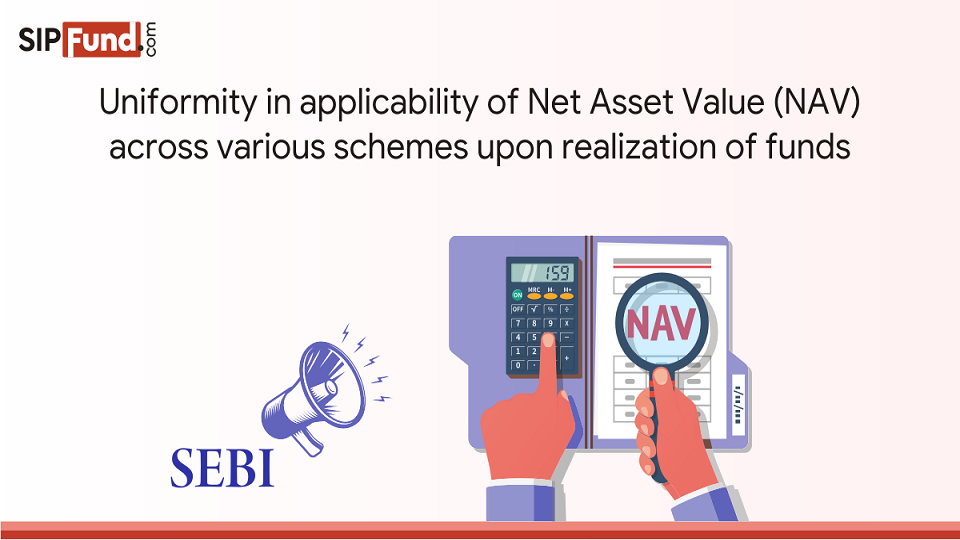
New NAV applicability rule by SEBI
What was there in SEBI’s circular dated 17th September 2020?
Securities and Exchange Board of India (SEBI)'s guidelines came out in a circular dated 17th September 2020 which mandated mutual fund houses to allocate units based on realization of funds regardless of the ticket size.
Old framework for calculating NAV was based on the amount of investments that is getting allocated in various schemes. Investment below INR 2 lakhs attracts allocation within the cut off time and in case of amount exceeding greater than INR 2 lakh then allocation is done after receiving investors’ fund in the AMC’s account.
New framework was proposed to bring uniformity in net asset value (NAV) allocation as it claims to remove the investment limit criteria. The calculation would be same for all amount of investments. This framework was supposed to be implemented by 1st January 2021.
Additionally, all investments by fund managers must be placed through dedicated dealers who are responsible for order placement and execution. SEBI has also made it compulsory for fund houses to use an automated order management system (OMS) and scheme-wise order placement in case the fund manager is managing several schemes.
If you are interested to know more about NAV and its calculation, please click the link: https://sipfund.com/blog/Net-Asset-Value-of-Mutual-Funds.html
What would be the impact of this decision on Industry?
Despite the operational challenges faced by Asset management companies, there would be other factors which need market regulator’s attention.
First, Systematic Investment Plans would be affected by this directive as most of the SIPs are less than ₹ 2 lakhs and allocation are done after a day or two post SIP date. The amount will be realized by the next day after debit date of bank. Investors must make sure that there is no delay in funds reaching the fund house because delays in transaction can have a huge impact on NAV. It will further impact the working of software used by investors in tracking their respective portfolios.
Second obvious effect would be on transaction done through cheque as unit allotment is possible only after clearing of the cheque. Any delay with respect to settlement of cheque can further pose a challenge for investors.
However, Investors using online platforms will not have to worry because they will remain unaffected since these rules are already present on online platforms.
Why this directive is welcomed by Asset management Companies?
Some asset management and mutual fund experts welcomed this directive and are of the opinion that this will create a level playing field to all investors by streamlining the process. This is considered as a fair rule as investors previously could participate even before clearing the cheque which was unfair for existing investors. After this rule, units of mutual funds will be allocated only after asset management companies receive money. Some industry experts also detailed out the advantage in terms of reducing cost compliance for same day NAV and returns of the fund house will get increased.
SEBI’s Circular dated 31st Dec 2020
SEBI has come up with new circular dated 31st December 2020 which provided relief to the mutual funds industry as they get more time to comply with the earlier circular dated 17th September 2020. SEBI has extended the date of compliance to 1st February 2021. This decision came as a result of request by AMFI to SEBI since industry was reeling under the process of streamlining the process with new NAV calculation. They have multiple accounts for redemption, dividends, custody etc. with different banks therefore in order to meet the criterion set by RBI, mutual funds must restructure their process with banks. This extended time will help the mutual funds/Asset Management companies in taking appropriate steps to comply of both circulars from RBI and SEBI.
What were the changes introduced in 31st December circular?
SEBI in its new circular added that dedicated dealers’ involvement is not compulsory for arbitrage transactions, stock lending and passive funds transactions. However, all other norms shall remain unchanged.
Conclusion
Whenever a new circular is out by SEBI, mutual funds must go through the hardships of changing and implementing new rules which takes time and lot of efforts. Although, mutual funds adapt to the change with the time and so as the investors. These rules are welcomed by most of the mutual funds since SEBI wants to create a fair and level playing field for all investors. The operational challenges faced by mutual funds will get resolved as they have been given sufficient time as SEBI has extended the compliance date.

